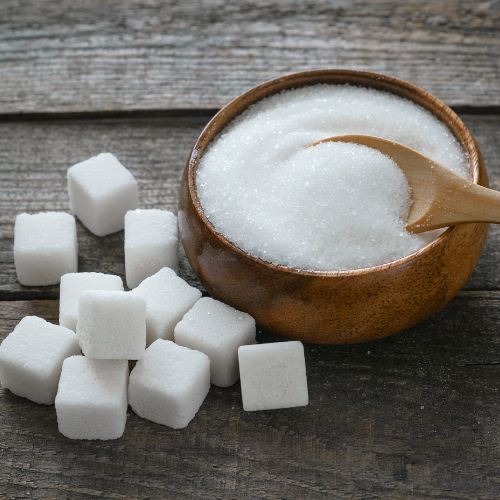Sugar and Cancer - Separating Fact from Fiction
Introduction: The Sugar Question
Few topics spark more debate in cancer care than sugar. You’ve likely heard the phrase: “sugar feeds cancer.” But what does that really mean? Is sugar the direct cause of cancer, or is the story more complicated?
The truth is: all cells in your body use glucose (sugar) for fuel, not just cancer cells. That doesn’t mean sugar is harmless, but it also doesn’t mean cutting out all sugar will automatically cure cancer.
In this blog, we’ll separate myth from fact, explain the science behind sugar and cancer and share practical ways to manage sugar intake without fear.
Myth vs Fact: Does Sugar Directly Feed Cancer?
The Myth
“Sugar goes straight to cancer cells and makes them grow.”
The Fact
Glucose is the body’s universal fuel. Your brain, muscles, and healthy cells all need it to survive. Cancer cells do consume glucose, but they don’t have exclusive access to it. Cutting sugar entirely from your diet won’t “starve” cancer without also starving healthy cells.
The Real Problem: Excess Sugar and Imbalance
While sugar itself doesn’t directly “cause” cancer, a diet high in sugar creates conditions that allow cancer to thrive.
Here’s how:
Insulin Resistance: Constant high sugar intake forces your body to produce more insulin, a hormone that also promotes cell growth — including cancer cells.
Inflammation: Excess sugar drives inflammation, a known risk factor for cancer.
Obesity & Diabetes: High sugar consumption contributes to weight gain, which is linked to increased cancer risk.
Weakened Immunity: Blood sugar spikes can impair immune function, making it harder for the body to control abnormal cells.
What Science Says
Studies confirm that while sugar isn’t a direct carcinogen, metabolic imbalance is a powerful driver of cancer risk. The link is less about sugar itself and more about how it disrupts hormones, weight, and inflammation.
This is why integrative cancer care emphasises balanced nutrition that stabilises blood sugar rather than complete elimination of carbohydrates.
Practical Tips: Managing Sugar Wisely
1. Choose Natural Over Refined
❌ Avoid: table sugar, high-fructose corn syrup, sweets, sodas, processed snacks.
✅ Choose: whole fruits (berries, apples), raw honey, or small amounts of maple syrup.
2. Prioritise Low-Glycaemic Foods
Foods that release sugar slowly help prevent insulin spikes:
Vegetables (especially leafy greens).
Whole grains (quinoa, oats, buckwheat).
Healthy fats (avocado, nuts, olive oil) to balance meals.
3. Pair Sugar With Protein or Fat
For example: eat berries with yoghurt, or apple slices with almond butter. This slows down sugar absorption and prevents blood sugar crashes.
4. Practice Portion Awareness
It’s not about zero sugar — it’s about moderation. Enjoy naturally sweet foods, but avoid constant grazing on sugary snacks.
5. Address Emotional Eating
Stress often drives sugar cravings. Techniques like mindful eating, journaling, or stress-reduction practices can reduce dependency on sugar for comfort.
Sugar Alternatives: Are They Safe?
Many people turn to artificial sweeteners when avoiding sugar. While some are considered safe, others may disrupt gut health or metabolism.
Better choices include:
Stevia
Monk fruit
Erythritol (in moderation)
Avoid chemical sweeteners like aspartame and saccharin, which remain controversial.
The Bigger Picture: Whole Diet Matters
It’s easy to get caught up in one nutrient, but cancer is influenced by the overall quality of your diet and lifestyle. A nutrient-dense, anti-inflammatory eating pattern does far more for prevention than obsessing over every gram of sugar.
Focus on:
Abundant vegetables and herbs.
Clean proteins.
Healthy fats.
Hydration and movement.
When sugar is part of a balanced, whole-food diet, its risks are greatly reduced.
Key Takeaways
All cells need glucose — cancer doesn’t get special access.
Excess sugar fuels inflammation, obesity, and insulin resistance, which raise cancer risk.
Balance, not elimination, is the healthiest approach.
Natural, low-glycaemic choices and mindful eating protect your body and support healing.
Final Thoughts
The conversation around sugar and cancer is often filled with fear. But when we understand the science, the fear fades and empowerment takes its place. It’s not about never touching sugar again — it’s about creating a balanced lifestyle that supports your body’s resilience.
At Cancer Care NZ, we believe in giving you clarity, not confusion. Visit The Healing Room for more nutrition tips, practical recipes, and guidance on building an anti-cancer lifestyle you can feel good about.

